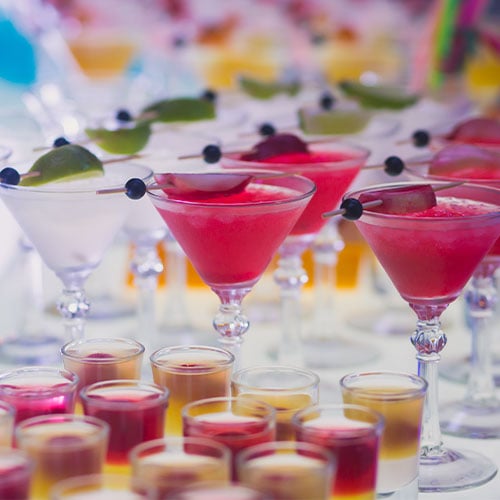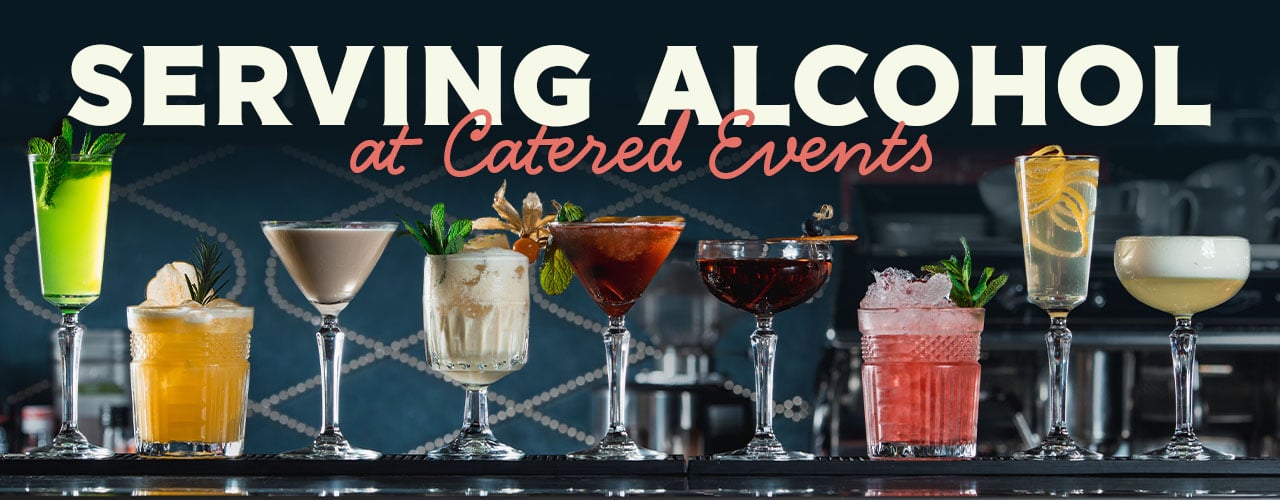If you're planning a wedding, holiday party, or reunion, serving alcohol allows you to elevate your catered events. Whether you're serving beer, wine, or liquor, serving alcohol is considered by many to be good hospitality. If you own a catering business but have never served alcohol, identifying a starting point can be difficult. We'll walk you through everything you need to serve alcohol at your next catered event.
Shop All Bartending SuppliesAlcohol Catering Tips
While serving alcohol at a catered event may seem simple, you will need insurance, proper licenses and permits, an experienced staff, and bartending supplies. We'll investigate each of them below:
1. Catering Insurance

Purchasing insurance is a key part of managing risk in the catering industry, and serving alcohol increases those risks. Without the proper coverage, you could face significant losses and risk going out of business. Get quotes from different insurance agencies to find the price and plan that fits your preferences. Though your required coverage can vary depending on your needs and where you operate, some examples of insurance related to the catering industry include the following:
- Business insurance: Sometimes known as commercial insurance, business insurance protects your catering business from unexpected loss of income related to property damage, theft, lawsuits, and vandalism.
- Liquor liability insurance: Designed to protect businesses that sell, serve, or distribute alcohol, liquor liability insurance is essential if you plan on offering alcohol at catered events. It provides coverage for any bodily injuries or property damage that you may be liable for as a result of serving alcohol. In some cases, liquor liability insurance is bundled with other insurance policies.
- Off-premise coverage: Catering consists of off-premise activities, making off-premise insurance an important policy to have. This type of coverage protects your equipment, as well as any equipment you might rent, from damage during transport or use.
2. Temporary Liquor License
A temporary liquor license allows you to serve and store alcohol for a set period. Sometimes referred to as a one-day license or special event license, these licenses are required for most catering businesses. Remember that if you apply for a temporary liquor license, alcohol can only be consumed within your venue. To make sure your event adheres to the standards set by your permit, answer the following questions:
- How many people will be in attendance? The more people that attend, the more alcohol you will need to serve.
- Where will the event be held? Your venue will likely be chosen by the client that hires you. It can affect the parameters in which you are allowed to serve alcohol and how you will set up your bar.
- Will guests have to pay to attend the event? Some catered events may be open to the public, while others are private. Events that charge guests can be classified as fundraisers, which can change the details of your permit.
- Who is purchasing alcohol for the event? In some cases, you will choose the alcohol selection, while in others it may be chosen by your client.
How to Get a Temporary Liquor License
The Alcoholic Beverage Control Agency (ABCA) in most states is responsible for issuing temporary liquor licenses. These organizations go by many names, making it important to check with local authorities before applying. To apply for a temporary liquor license, follow these steps:
- Apply early: Submit your application at least 10 days before the event. If you apply later than this, you may be subject to an expedited processing fee.
- Choose a license: Most states provide a variety of different liquor license options to choose from. For example, permits for a wedding may vary from permits for a fundraiser. Study the options available and select the license that best fits your output and needs.
- Provide documentation: In most cases, your state’s ABCA will require additional documents to approve your application. This may include presenting a valid state ID, completing a background check, and providing a business location. Reach out to them beforehand to verify you will have all the necessary information on hand.
- Pay fees: In addition to expedited processing fees, your state's ABCA may require an application fee to acquire your license.
3. Bartending Staff

Catered events like weddings and parties can be busy, making it essential to have qualified bartending staff to keep up with demand. They will be responsible for taking beverage orders, serving drinks, and maintaining their workstation. When finding bartenders for your event, there are three options to choose from:
- Hire your own bartenders: If you plan on consistently offering alcohol at your catered events, you can hire a bartending staff. When hiring a bartender, look for candidates who provide excellent customer service, have extensive knowledge of beer, wine, and liquor, and can work efficiently in fast-paced environments.
- Cross-train your staff: If you don’t want to hire additional staff members, consider cross-training your existing catering staff. In some cases, your staff members may have previous bartending experience.
- Hire a bartending service: In place of hiring a new bartender or training your staff, you can also hire a bartending service. These services offer fully trained and certified bartenders with experience. In many cases, the company will provide their equipment and accessories.
4. Bartending Supplies
To complete your alcohol catering service, invest in proper bartending supplies. With the right tools and equipment, you can elevate your service to ensure every guest has a positive experience. It’s important to note that while there are many bartending essentials, the exact type of equipment you’ll need can vary depending on what drinks you plan to serve. For that reason, you should review each recipe before the event. We’ve listed some of the most common types of bartending supplies below:
- Cocktail shakers: Shakers allow you to mix alcoholic drinks and ice, keeping the beverage cold.
- Cocktail strainers: A cocktail strainer filters pulp, ice, and other unwanted particles out of your drink to ensure proper texture.
- Jiggers: These tools allow your bartenders to measure liquor. Jiggers come in several shapes and sizes so that you can choose the type that best fits your needs.
- Bar spoons: Bar spoons come in many different styles and allow you to stir drinks.
- Garnishing tools: Garnishes allow you to accentuate drinks. Depending on the recipe, you may need garnishing tools to achieve the proper presentation.
Cash Bar vs Open Bar

The difference between a cash bar and an open bar is payment. At a cash bar, guests pay for each drink they order. Conversely, an open bar is paid for by the host in advance. The type of bar you use is determined by the nature of the event and the preferences of the host. For example, open bars are associated with weddings while cash bars are associated with reunions and some private parties. We’ve outlined some pros and cons associated with each type of bar below:
Pros and Cons of a Cash Bar
Some advantages of a cash bar include the following:
- Guests are less likely to overdrink
- Ideal for smaller events
- Lower initial cost
Disadvantages associated with offering a cash bar are listed below:
Pros and Cons of an Open Bar
The advantages of offering an open bar are as follows:
- Reduced lines and wait times for drinks
- Control over what drinks are served
- Set cost
We’ve listed some disadvantages of open bars below:
What Is a Hosted Bar?
A hosted bar is a cross between an open bar and a cash bar. With a hosted bar, drinks are paid for by the host at the end of the night. This gives guests the freedom to drink as much as they’d like during the event without requiring a high initial cost. In most cases, the final bill is determined by how many bottles have been used at the end of the night. Not only does this ensure that there is enough alcohol for the event, but it also helps to reduce wasted product.
Serving alcohol at a catered event can be difficult. There are many obstacles to navigate and several variables that can affect your event. Whether you’re new to the catering business or just looking to improve your service, this resource can help you make informed decisions when serving alcohol.



